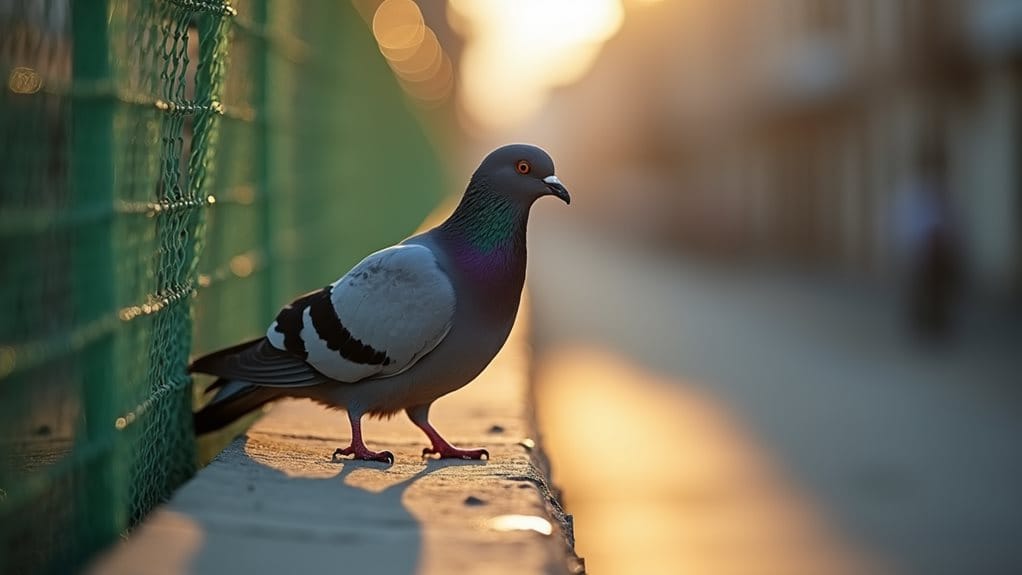Is It Illegal to Kill Pigeons? Legal Insights
You might think it's straightforward when it comes to killing pigeons, but the legality of such actions can be surprisingly complex. While federal laws often don't protect Rock Pigeons, your local regulations could impose strict guidelines or even outright bans. Ignoring these rules can lead to hefty fines or worse. So, what do you need to know about your specific jurisdiction, and what alternatives exist for managing pigeon populations? The answers could change your viewpoint on how to handle these common birds.
TLDR
- Rock Pigeons are generally not federally protected, allowing for removal under certain conditions, but local regulations must be followed.
- Laws differ by state and locality, so it's essential to check specific regulations regarding pigeon control in your area.
- Unauthorized killing of pigeons may lead to significant legal penalties, including fines or criminal charges, depending on jurisdiction.
- Humane alternatives, such as deterrents and habitat modification, are encouraged to manage pigeon populations without lethal methods.
- Always ensure compliance with local laws to avoid legal consequences when dealing with pigeon control issues.
Federal and State Laws

When it comes to killing pigeons, understanding federal and state laws is essential.
You might think all pigeons are protected, but guess what? Rock Pigeons aren't! Federal laws focus on migratory birds, while states like New Jersey let you remove them for public health. However, it's important to note that while some birds like eagles are heavily protected under the Bald and Golden Eagle Protection Act, pigeons do not fall under the same level of federal protection. Additionally, engaging in responsible actions related to illegal dumping can help maintain community standards and prevent similar issues with wildlife.
Local Regulations
Understanding local regulations is just as important as federal and state laws when it comes to managing pigeon populations.
You've got to know that rules change from state to state and even county to county!
If pigeons are causing trouble, some cities allow you to take them—just remember, be humane, and don't mess with those fancy homing pigeons—they're off-limits! Hunting laws vary by state and local ordinances, so it's crucial to familiarize yourself with the specific regulations in your area. Always check first! Additionally, keeping safety standards in mind can help prevent any unintended consequences while managing local wildlife.
Penalties for Unauthorized Killing

Unauthorized killing of pigeons can lead to serious legal consequences, varying considerably by jurisdiction. In the UK, you could face unlimited fines or even five years in prison! In the US, animal cruelty laws could land you in hot water too. Additionally, such actions may violate contraventions regulations that aim to ensure compliance with Canadian laws. Furthermore, awareness of animal protection laws is crucial in understanding the legal ramifications of harming wildlife.
Exemptions and Special Cases
If you're considering killing pigeons, it's essential to know that there are exemptions and special cases that could apply to your situation.
For instance, if you own the land, you can act without a license, and if you're over 65, you're in the clear too! Additionally, a resident hunting license is usually required for state residents, so be sure to check your local regulations before taking action. It's also important to be aware of animal welfare laws, as they can vary significantly depending on your location. Just remember, not all pigeons are fair game—know your species before you make a move!
Alternative Control Methods

If you're looking for ways to keep those pesky pigeons at bay without causing them any harm, there are some really cool humane deterrent techniques and exclusion strategies you can try.
For instance, have you ever thought about installing bird spikes or using shiny reflective devices that confuse their little bird brains? Physical exclusion techniques are highly effective in preventing pigeons from perching on surfaces, giving them a friendly nudge to find a new hangout spot, and you'll be amazed at how effective these methods can be! Additionally, creating a habitat for dragonflies can help control mosquito populations in your area, which may reduce the overall nuisance of pests like pigeons.
Humane Deterrent Techniques
Humane deterrent techniques provide effective alternatives for managing pigeon populations without causing harm.
You can try using decoy kites or reflective devices, which are fun and easy to set up. Motion-activated lasers and noise deterrents can startle those pesky birds too! Plus, strong smells like cinnamon might just make your space less appealing to them. Pigeon droppings can also pose health risks, so keeping your area clean and free of food sources is crucial in deterring them. Who knew bird control could be this creative?
Exclusion Strategies
When it comes to managing pigeon populations, exclusion strategies offer a practical and effective approach.
Imagine bird netting acting like a shield, preventing those pesky pigeons from nesting! Bird spikes and wires are like bouncers at a club, turning away unwanted guests. Plus, combining these methods with other tactics, like habitat modification, makes your space less inviting. Natural predation serves as an additional method to control pigeon populations, complementing these exclusion strategies. Who knew keeping pigeons away could be this fun?
Cross-Border Legal Differences
When you think about killing pigeons, you might be surprised to learn that the laws can be as different as night and day depending on where you are, like trying to compare a sunny beach in California to a rainy day in London! In the U.S., you might find specific laws that protect certain birds, while in the UK, there could be strict regulations that allow for culling under certain conditions—can you imagine the confusion if you were traveling and needed to know who's got the upper hand on pigeon control? EU directives govern bird protection and hunting practices across European countries, leading to varying levels of enforcement and legality concerning pigeon culling.
U.S. vs. UK Laws
Laws regarding the killing of pigeons differ greatly between the U.S. and the UK, reflecting varied cultural attitudes toward wildlife and animal welfare.
In the U.S., you can generally trap feral pigeons on your property, but in the UK, it's mostly illegal without a special license.
Search functionality enables access to legislative documents that clarify these laws.
Isn't it wild how different places handle their feathered friends? Always check local laws before making any decisions!
Global Protection Variations
Across the globe, protections for pigeons vary considerably, influenced by local customs and conservation efforts.
In the U.S., they're not federally protected, but in the UK, harming pigeons is a no-no! Some cities even fine you for feeding them. So, before you toss breadcrumbs around, check the rules! It's like a scavenger hunt, but with laws—how thrilling! Additionally, in the UK, the Wildlife and Countryside Act 1981 makes it illegal to harm wild birds, which includes pigeons.
Importance of Compliance

Understanding the importance of compliance with local, state, and federal regulations is essential when dealing with pigeon control. You wouldn't want to accidentally break a law while trying to shoo away those pesky birds, right? Each area has its own rules, so always check what's legal first. Staying compliant keeps you out of trouble and guarantees a safe, humane approach to pigeon management! Additionally, be aware that killing Rock Pigeons is permitted for population control under specific conditions in New Jersey.
Overall
So, before you think about taking matters into your own hands with those pigeons, remember it's super important to check your local laws! Killing pigeons isn't always illegal, but you could end up in a legal mess faster than you can say "pigeon pie!" Instead, why not try some friendly alternatives? Think about it—there are tons of ways to manage those feathered friends without breaking any rules. Let's keep it cool and humane, and save those wild escapades for camping trips instead!







